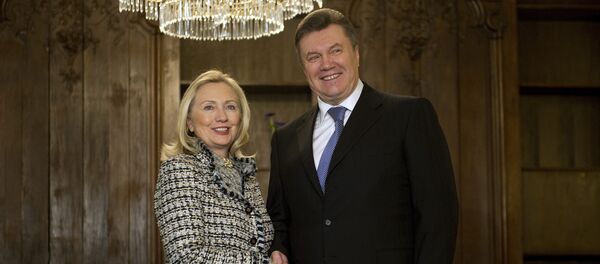"I still want HRC [Hillary Rodham Clinton] to win badly," Cheryl Sandberg, chief operating officer of Facebook wrote in an email to the Clinton campaign that Julian Assange posted on Twitter Friday.
— Julian Assange 🔹 (@JulianAssange) September 28, 2017
"I am still here to help as I can," Sandberg vowed before gushing that Clinton "came over and was magical with my kids." Clinton wound up driving $55 million in revenues to Facebook by purchasing ads on Sandberg’s platform, Politico reported.
Those evil "Russians” meanwhile spent $150,000 on Facebook ads in roughly the same time period – allegedly. As University of Pittsburgh Law Professor Dan Kovalik told Radio Sputnik’s Loud & Clear this week, the editorial gurus at the Washington Post don’t even know what entity or entities exactly purchased the controversial ads. Instead, US media outlets are “just presuming it was a Russian company of some sort,” Kovalik said Tuesday.
In addition to vocally expressing her support for the first major female candidate, Sandberg met with Clinton “on multiple occasions,” the WikiLeaks publisher tweeted, with attachments of photos documenting that Sandberg offered to present Facebook’s research “on gender and leadership by women,” according to one of the emails written by Clinton confidant Cheryl Mills.
Facebook CEO Mark Zuckerberg meanwhile sent emails to Clinton campaign manager John Podesta to the tune of “I enjoyed spending time with you yesterday and our conversation gave me a lot to think about … I hope it’s okay if I reach out as my thinking develops to get your ideas and reactions. If there are any other folks you think I should talk to, please let me know. Thanks again. I look forward to continuing our conversation.” The multi-billionaire ended the email with a cordial “Mark.”
Assange left out a major player in the tweets: Virginia native Eric Schmidt, executive chairman of Google’s parent company Alphabet.
'Head Outside Adviser'
Pining to become a formal part of Clinton’s staff, Schmidt enthusiastically showcased his ideas in an email correspondence with Mills, who was also former President Bill Clinton’s attorney during his 1999 impeachment trial.
“Cheryl, I have put together my thoughts on campaign ideas and I have scheduled some meetings in the next few weeks for veterans of the campaign to tell me how to make these ideas better. This is simply a draft but do let me know if this is a helpful process for you all. Thanks!! Eric,” he wrote, according to an email Mills forwarded to key Clinton campaign staffers Robby Mook, John Podesta and David Plouffe.
"Let’s assume a total budget of about $1.5 billion," Schmidt wrote, launching into his vision for setting up Clinton’s campaign. “It’s important to have a very large hiring pool (such as Chicago or New York) from which to choose enthusiastic, smart and low-paid permanent employees,” he explained before stating that Amazon would be a crucial partner in how he wanted to set up the campaign operations.
"The computers will be in the cloud and most likely on Amazon Web Services (AWS)," he said. To be fair, AWS is one of the most widely used server farms by the US government.
Indeed, AWS is the link between Jeff Bezos and the CIA: arguably America’s finest intelligence agency paid Bezos’ company $600 million for a "computing cloud developed by Amazon Web Services for the Central Intelligence Agency" that "will begin servicing all 17 agencies that make up the intelligence community," The Atlantic reported in July 2014.
Give Schmidt credit for suggesting Clinton’s campaign use a service good enough for the CIA — perhaps better cyber defenses would have prevented the so-called DNC "hack" blamed, of course, on the Russians (and which several independent former intelligence officers have argued was a leak).
Schmidt outlined his ideas to include discussions on "size, structure, and timing" of the campaign, the location for the campaign’s headquarters, six points on “the pieces of the Campaign," – "The Field," "The Voter," "Digital," "Media (paid), (earned) and (social), and polling," "Analytics and data science modeling, polling and resource optimization tools" and "Core engineering, voter database and contact with voters online."
Schmidt would ultimately settle for a role outside the formal campaign, though the position did not wind up as a small one. “I met with Eric Schmidt tonight,” Podesta wrote in an April 2014 email to another staffer. "He’s ready to fund, advise, recruit talent, etc. [He] clearly wants to be head outside advisor, but didn’t seem like he wanted to push others out."
Some US lawmakers are becoming frustrated at, apparently, Twitter and Facebook’s inability to conjure up actual Russian wrongdoing on their platforms. Given "all of the press interest in this subject," US Senator Mark Warner (VA) fumed Thursday, the results of what appears to be quite thorough searching by the social media giants remain "inadequate."




